Technique 1.109 Cognitive Budget
Introduction
"...our brains are capable of processing only a fraction of the information available to them, and we have a fixed amount of mental energy at our disposal, regardless of how much we want or need in any given moment..."
Jordan Birnbaum, 2022
NB Our brain desires to be use as little as possible mental energy. This is fuel efficiency, not necessarily laziness.
As we have limited energy, you need to spend it effectively and efficiently, not waste it on things that distract us or are of limited benefit.
We need to budget our energy use. However, your daily operations are unpredictable and your brain doesn't work like a spreadsheet.
Bear in mind the distinction between conscious and unconscious thinking; the latter helps to protect us emotionally and functionally from everyday life challenges, like massive information overload, painful feelings, etc.
The unconscious thinking has been broken into 2 types (Daniel Kahneman - for more detail, see elsewhere in the Knowledge Base):
i) system 1 (thinking is fast, easy, intuitive and emotional)
ii) system 2 (thinking is hard, slow, intentional and logical)
For example, compare your familiar drive home from work (system 1) to driving to an unfamiliar location (system 2); the latter takes a lot more work and effort.
As we have a limited amount of system 2 thinking, we spend as much time in system 1 thinking as possible, ie up to 95% of decisions are made unconsciously.
"...our unconscious minds often keep us from thinking about what's good for us and drives us to think what's not so good for us..."
Jordan Birnbaum, 2022
Use of budgeting to prioritise thinking plus being proactive and reactive
"...proactive in budgeting that limited currency of system 2 thinking and reacting in responding to our conscious minds which too often leads us toward counter-productive thinking..."
Jordan Birnbaum, 2022
Reflection and Rumination
Reflection
"...is the most valuable type of thinking we can do, because we get the greatest return on investment of mental energy from it. Reflective thinking gains us access to the very best of our mind, from the remarkable (our genius) to the meaningful (our compassion, empathy, forgiveness, and capacity for joy. It may be hard work, but reflection enables us to make the hard stuff in life worth it..."
Jordan Birnbaum, 2022
Key components of reflection include
- humility, ie thinking without an agenda as most agendas are used to protect and enhance self-image
- considering conflicting perspectives
- re-evaluating your beliefs, ie learn to question your own beliefs
- be prepared to be vulnerable and/or uncomfortable and/or challenged
Rumination
This involves
"...replaying events repeatedly in your mind without leaning insights or progressing. Rumination uses mental energy that could have otherwise been spent on something worthwhile..."
Jordan Birnbaum, 2022
It is hard to stop or intercept ruminating happening as your unconscious mind takes you there without you knowing.
Need to be able to identify when you are ruminating and to stop it. One way to do this is by using cognitive behavioural therapy which focuses on triggering events as the cause of most of your emotional and behavioural challenges, rather than the events themselves. We need to challenge our thinking in these moments that transform our effectiveness and how we experience life.
NB need to be careful of regression, ie the use of rumination as an excuse to avoid reflecting on the important stuff. Regression is worse than rumination, ie .
"...ruminating never leads to any new ideas, new behaviours, or a sense of resolution..."
Jordan Birnbaum, 2022
You need to plan to handle the pitfalls of rumination and to reap the rewards of reflection.
Cognitive Budget
It aims to help by
"...proactively directing your mental energy where you want it to go (reflection) and stop your mental energy from the actively going where you don't (rumination)..."
Jordan Birnbaum, 2022
It helps you be more intentional about your use of mental energy; it separates work and personal concerns to make each more manageable.
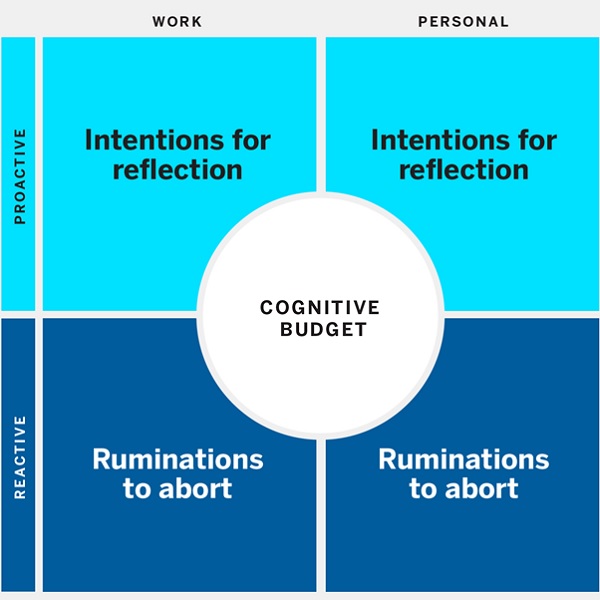
(source: https://www.sloanreview.mit.edu/article/building-the-cognitive-budget-for-your-most-effective-mind)
Intentions for reflection
Can ask specific questions like why is the team struggling or why it is so successful, to considering more general topics like professional development, career advancement, etc
Rumination to abort
Can ask questions to help you recognise them more readily, eg
- what do you think about that make you feel worse, the longer you think about it?
- what topics do you consistently return to without making any progress towards a solution?
- what past painful moments do you relive repeatedly without moving forward, etc?
NB The underlying ideas are more than words
Reflections at work
Some areas to think about when considering your work life
- mission (identify areas you care about and find ways to devote more time to them, etc)
- growth (acquire skills that add value and advance your career, etc)
- interpersonal relationships (improve and build relationships, nurturing connections, etc)
- strategy (identify challenges and their solutions; plan for the future, etc)
- operations (improve effectiveness and efficiencies; prioritise and measure, etc)
- innovation (encourage creativity and diversity of ideas; provide iteration; improve implementation; create value, etc)
- customers (increasing their satisfaction, supporting their retention and driving engagement; winning new customers, etc)
- marketing (9 Ps - planning, pricing, product, position, promotion, place, process, people and passion; evaluate value proposition, etc)
- support (provide resources like finance, people, facilities, time, etc)
Some examples
- Alex (starting her career in software product management) and Sam (has an established career in marketing) on work (proactive and reactive)
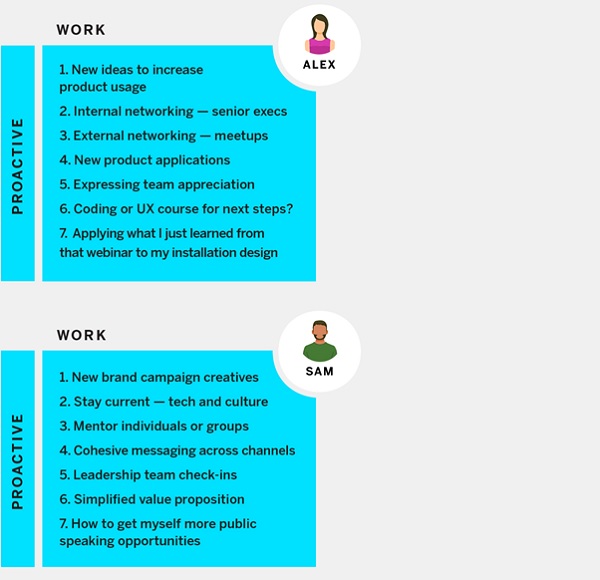
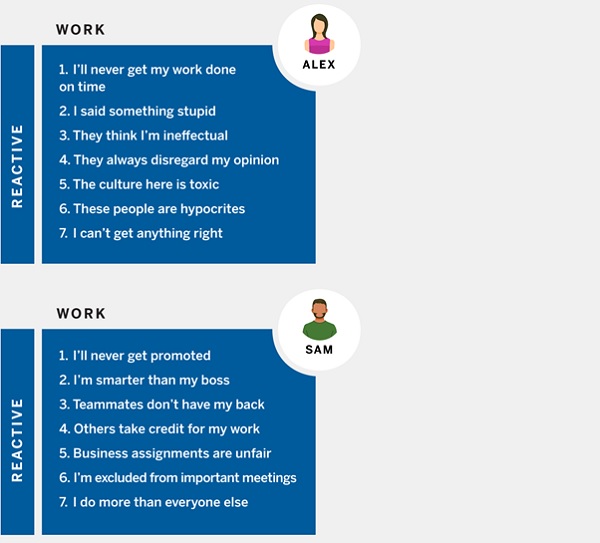
(source: https://sloanreview.mit.edu/article/building-the-cognitive-budget-for-your-most-effective-mind/)
This activity can help Alex and Sam understand their situation better and prompt appropriate action.
Another example is a team leader, ie Bernadette; she has 7 direct reports which are included in the budget
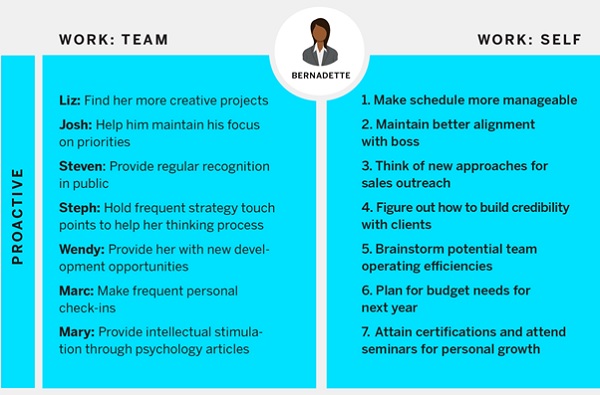
(source: https://sloanreview.mit.edu/article/building-the-cognitive-budget-for-your-most-effective-mind/)
Usually most managers are very busy. However, their first priority should be getting the most from their teams and direct reports. A cognitive budget can help them get this priority right, ie
"...What do your team members need? What actions can you take to support them? And how are they doing right now?..."
Jordan Birnbaum, 2022
Remember: needs change and you need to regularly check, ie weekly, what is happening.
Ruminations at work
Work-related ruminations impact negatively on people's performance; some sources include
- exclusion (being left out of meetings, consideration, decision-making, etc)
- organisational politics (gossip, toxicity, conflict, power dynamics, status, etc)
- disappointment (missing out on opportunities, promotions, assignments, deals, etc)
- task management (managing deadlines, volume, status, etc)
- fairness ( dealing with unfair treatment, rewards, consequences, etc)
- interpersonal relationships ( navigating collaborations, lack of support, incivility, etc)
- insecurity (facing impostor syndrome, low self-efficacy, low self-esteem, lacking confidence, etc)
Two examples of workplace rumination that need to be recognised and addressed promptly
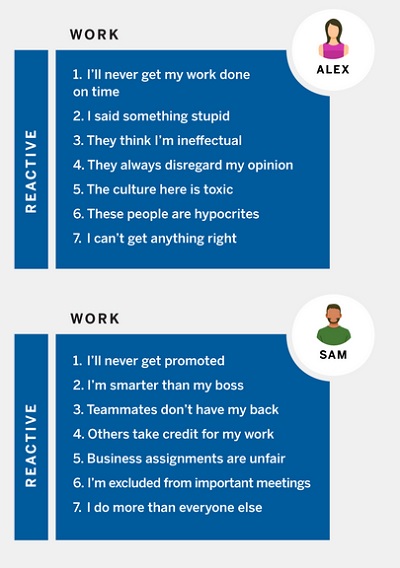
(source: https://sloanreview.mit.edu/article/building-the-cognitive-budget-for-your-most-effective-mind/)
Ways to handle rumination include
i) being aware of what it is happening, ie destructive and unproductive thinking
ii) consciously shifting your focus to something productive, ie use sheer willpower to redirect your thoughts and answer the following question
"...What is the evidence for or against this idea? Am I taking selective examples out of context? Are my judgements based on feelings rather than facts?..."
Jordan Birnbaum, 2022
Need to determine whether your statements are based on rational or irrational thoughts.
Use logic and/or broader perspective to change unconsciously-driven rumination.
Sometimes professional help is required.
iii) do something about it
NB
"...the goal is not to ignore the subjects of your rumination. Addressing rumination means acting or finding closure. The only unacceptable outcome is continued ruminating..."
Jordan Birnbaum, 2022
Creating your personal cognitive budget
Possible categories in this budget can be infinite and vary over time. Some examples include social connections, personal growth, etc
When reflecting, you need to determine if it is worthy of your focus.
Some good starting questions
"...What do you want to think about? What makes you happy? What do you want to improve?..."
Jordan Birnbaum, 2022
A brief review of Maslow's theory of self-actualisation is also a good starting point (more details, see elsewhere in the Knowledge Base)
Best practice cognitive budgeting.
Some tips include nudging self (sending yourself reminders through different channels so these reminders are harder to ignore, eg
- make your budget visible (otherwise, out of sight, out of mind)
- incorporate your budget in your daily routine (regularly read your complete budget during the day, ie prime reflecting time; schedule a few alarms on your phone as reminders to check your budget)
- review and refresh your budget (continually update your budget)
NB cognitive budgeting
"...combines data-validated techniques that work from positive psychology, cognitive behavioural therapy and behavioural economics..."
Jordan Birnbaum, 2022
